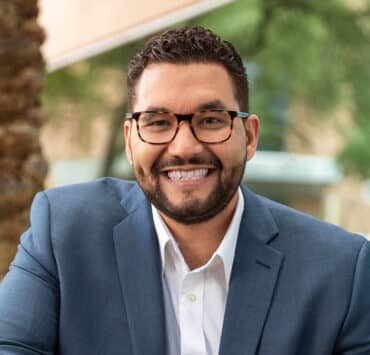|
Getting your Trinity Audio player ready...
|
Carmel Ortiz’s role as vice president of systems innovation at satellite communications company Intelsat takes her across the US and around the globe.
“On any given day, I might be working with our internal engineering teams to develop our system architecture or map out our next research and development priorities, or I might be traveling to a design review with one of our satellite manufacturers,” Ortiz says. “And occasionally, I get to support our commercial teams, presenting our technology plans to current and future customers.”
As much as she enjoys visiting different locations and geographies, Ortiz makes a point of grounding herself in the day-to-day activities of her team at Intelsat’s headquarters in McLean, Virginia. The team operates much like a family, with Ortiz drawing on the values of her own household growing up to inform her approach to leadership and innovation. Dovetailing with those values is her deep passion for the satellite industry––and for its tangible impact on the ability of communities to connect with one another.
“What we’re doing here at Intelsat is really hard work, but as engineers, that’s what we live for.”
Carmel Ortiz
Ortiz discovered that passion early on in her career. After graduating with an electrical engineering degree from Georgia Tech, she cut her teeth in the satellite division of a large telecommunications company. She later cofounded an engineering consultancy with a few colleagues––a move that felt risky at the time. Ultimately, though, it created opportunities for her to work with exciting clients without sacrificing time at home with her young children.
As the years went on, however, Ortiz began to crave a new challenge. “I landed at an ambitious satellite startup, whose goal was to launch hundreds of satellites in low-earth orbit, with the aim of connecting the unconnected across the globe,” she says. She discovered a similar mission upon joining Intelsat in 2020, when she received the opportunity to lead the company’s innovation team, and thereby shape its technology roadmap.
Ortiz knew that coming on board at Intelsat would allow her to contribute to projects aligning with her areas of interest––a factor she encourages aspiring professionals to consider when charting their own paths in the industry. “Find something that you really want to be part of, with a team and a leader who value your skills and potential,” she urges. “And, when you start to feel fear or doubt, ask yourself what you would do if you weren’t afraid and then do that.”
When it comes to engaging with and inspiring her team at Intelsat, Ortiz thinks back to the values she learned as a child. “I come from a very large, very lively, and very close-knit family. Within that context, I was raised to value family above all, and then from there, hard work and education,” she says. “Now, my colleagues are a bit like family. It’s important for us to take care of one another and make sure that everyone feels valued.”
Ortiz sees a clear place for hard work and education in her work, as well. “The space and satellite industry is pretty amazing, in that the technology innovation never stops,” she says. “We have to keep sharpening our tools and educating ourselves on the latest and greatest. What we’re doing here at Intelsat is really hard work, but as engineers, that’s what we live for.”
“On some level, I hope that, by just coming to work every day, I’m contributing to the diversity of Intelsat and of the industry at large.”
Carmel Ortiz
That hard work pays off, not just for Intelsat itself, but for the customers and communities it serves. “I’m really proud of the work that our company is doing to drive equity in underserved nations, as a major provider of the connectivity services needed to enable education and economic development,” Ortiz says. “Intelsat also works with organizations like Help.NGO to provide satellite communications when telecommunications infrastructure goes down after earthquakes, hurricanes, and other natural disasters.”
Enhancing equity is an equally high priority within Intelsat, where recent diversity, equity, and inclusion initiatives have included conducting employee surveys and focus groups, educating team members around unconscious biases, and implementing a holistic learning and development curriculum. For her part, Ortiz hosts an informal women’s networking group and serves as coexecutive sponsor of HOLA, Intelsat’s recently launched Hispanic Origin/Latin American employee resource group.
“Visibility is important for inspiring belief in our potential to succeed in a career or an industry where we have passion. Young girls need to see women launching satellites, achieving great things in scientific fields, and leading industries,” says Ortiz. “On some level, I hope that, by just coming to work every day, I’m contributing to the diversity of Intelsat and of the industry at large.”

